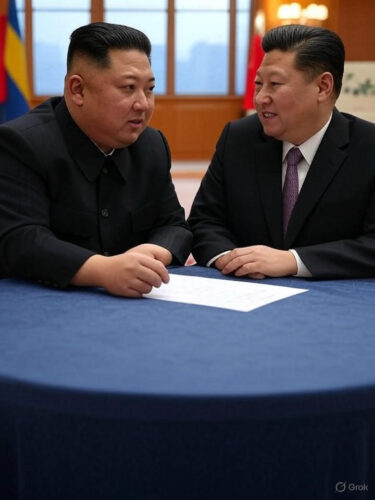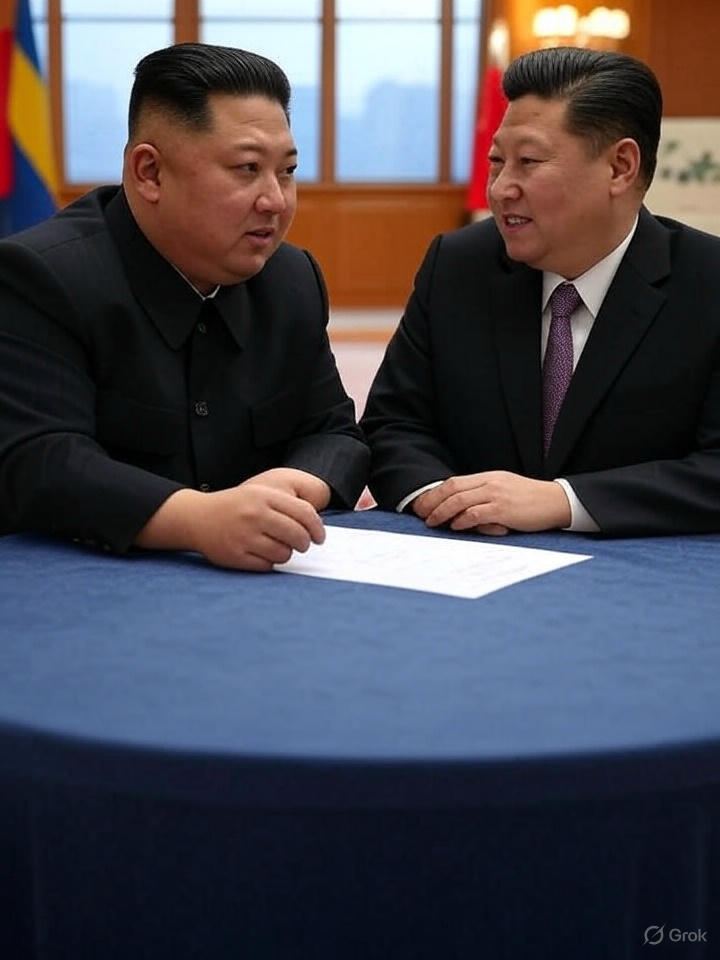
North Korea and China Attack US After Iran Strike speculation has gripped the world following the U.S. military’s unprecedented airstrikes on Iranian nuclear facilities at Fordow, Natanz, and Isfahan on June 21, 2025. President Donald Trump announced the operation, dubbed “Operation Midnight Hammer,” as a decisive blow to Iran’s nuclear ambitions, claiming the sites were “completely obliterated.” The strikes, escalating the Israel-Iran conflict, have drawn sharp condemnation from China and North Korea, raising fears of a coordinated retaliation against the U.S. Defense Secretary Pete Hegseth warned of a potential “anti-US axis” forming among Iran, North Korea, and China, citing their growing strategic alignment. As global leaders urge restraint, the question looms: Could these authoritarian powers unite to challenge the United States?
North Korea and China Attack US After Iran Strike: A Growing Concern
The phrase North Korea and China Attack US After Iran Strike captures the anxiety surrounding this volatile moment. The U.S. strikes, the first direct military action against Iran, targeted deeply buried nuclear sites with bunker-buster bombs, severely disrupting Tehran’s uranium enrichment capabilities. Iran’s Foreign Minister Abbas Araghchi called the attacks “outrageous,” vowing retaliation, while China’s Foreign Ministry condemned the U.S. for violating the UN Charter. North Korea, a longtime ally of Iran, denounced the strikes as a “crime against humanity” and accused the U.S. of “fanning the flames of war.” These strong statements have fueled speculation about a broader coalition against the U.S.
Why does this matter? The possibility of North Korea and China aligning with Iran to retaliate introduces a new layer of complexity to an already tense geopolitical landscape. Could their combined military and cyber capabilities pose a credible threat to U.S. interests? Let’s explore the dynamics driving this scenario.
The Emerging Anti-US Axis: Fact or Fear?
Defense Secretary Pete Hegseth’s remarks about an “emerging anti-US axis” have sparked intense debate. He attributed the closer ties between Iran, North Korea, and China to the Biden administration’s foreign policy, which he claims emboldened authoritarian regimes. During a Pentagon briefing, Hegseth did not rule out a coordinated attack, citing increased military cooperation between Iran and North Korea, including drone and missile technology exchanges, and China’s tacit support for their anti-Western stance.
But how realistic is this threat? North Korea’s nuclear arsenal and China’s vast military resources are formidable, yet both nations face significant constraints. North Korea’s economy is heavily sanctioned, and its military, while aggressive, lacks the capacity for sustained overseas operations. China, wary of economic repercussions, has historically avoided direct confrontation with the U.S. Still, their shared opposition to U.S. hegemony, coupled with Russia’s growing ties to both nations, raises questions about their next moves.
Iran’s Retaliation Options: A Catalyst for Wider Conflict?
Iran’s response to the U.S. strikes could determine whether North Korea and China escalate their involvement. Experts suggest Iran has several options, from launching missile strikes on U.S. bases in the Gulf to deploying proxies like Yemen’s Houthi rebels to target American ships in the Red Sea. A more extreme scenario involves Iran withdrawing from the Nuclear Non-Proliferation Treaty (NPT), following North Korea’s 2003 playbook, and accelerating its nuclear program covertly.
Such a move could embolden North Korea, which has long viewed its nuclear weapons as a deterrent against U.S. aggression. If Iran openly pursues a nuclear bomb, could North Korea provide technical assistance, further aligning their strategies? China, while publicly advocating for diplomacy, might quietly support this shift to counter U.S. influence in the region. The interplay of these actions keeps the world on edge.
North Korea’s Stance: Bluster or Genuine Threat?
North Korea’s fiery rhetoric is nothing new, but its recent statements carry added weight. Pyongyang’s Foreign Ministry condemned the U.S. strikes as part of a broader pattern of Western aggression, accusing Washington of destabilizing the Middle East. This aligns with North Korea’s strategic partnership with Iran, which includes supplying artillery shells and drones to Russia for its war in Ukraine—a sign of deepening military ties among anti-Western states.
Could North Korea act on its threats? Its underground bunkers, once thought impregnable, now appear vulnerable after the U.S. demonstrated its ability to destroy Iran’s fortified nuclear sites. This may push Kim Jong-un to escalate provocations, such as missile tests or cyberattacks, to signal defiance. Yet, a direct attack on the U.S. seems unlikely given North Korea’s limited resources and reliance on China for economic survival.
China’s Role: Diplomatic Condemnation or Military Support?
China’s response has been measured but firm. Beijing condemned the U.S. strikes as a violation of international law and urged all parties, particularly Israel, to pursue dialogue. Behind the scenes, however, China’s strategic interests align with Iran and North Korea. As a major buyer of Iranian oil and a key supporter of North Korea, China has a stake in countering U.S. dominance. Its sophisticated cyber capabilities, alongside those of Iran and North Korea, could target U.S. infrastructure in a coordinated campaign.
Still, China’s economic ties to the U.S. and its focus on domestic stability make direct military action improbable. Instead, Beijing might amplify its diplomatic efforts, rallying support at the UN or providing covert aid to Iran. The question is whether China would risk a broader conflict to protect its allies.
Global Reactions: A World Divided
The international community is split. Allies like Israel and the UK have praised the U.S. strikes, with Israeli Prime Minister Benjamin Netanyahu calling them a “bold decision.” Meanwhile, Russia, Pakistan, and Yemen’s Houthi movement have joined China and North Korea in condemning the attacks. The EU and South Korea have called for de-escalation, reflecting widespread fear of a wider war.
This division underscores the stakes. If North Korea and China were to retaliate alongside Iran, it could draw in other powers, from Russia to NATO allies, risking a global conflict. The UN Security Council’s emergency meeting on June 22 failed to produce a unified response, highlighting the challenge of diplomacy in this crisis.
What Could Trigger a Coordinated Attack?
For North Korea and China Attack US After Iran Strike to become reality, several factors would need to align. First, Iran would need to launch a significant retaliation, such as closing the Strait of Hormuz or attacking U.S. bases, prompting a U.S. counterstrike. Second, North Korea would need to perceive a direct threat to its regime, possibly from U.S. military buildup in the region. Third, China would need to calculate that supporting its allies outweighs the economic and diplomatic costs.
Cyber warfare is a more likely avenue than conventional attacks. Iran, North Korea, and China possess advanced offensive cyber capabilities, capable of targeting U.S. financial systems, power grids, or defense networks. A synchronized cyberattack could disrupt U.S. operations without escalating to open war, allowing these nations to send a message while avoiding catastrophic consequences.
The Path to De-Escalation
Despite the rhetoric, diplomacy remains possible. The U.S. has insisted it is not at war with Iran and has left room for negotiations. Trump’s warning of further strikes if Iran retaliates suggests a desire to project strength while keeping channels open. China’s call for an “immediate ceasefire” and dialogue could serve as a bridge, though its credibility is questioned given its alliances.
For North Korea, de-escalation would require assurances that its nuclear arsenal remains a sufficient deterrent. Engaging Pyongyang through backchannels, possibly via China, could prevent provocative actions. The international community, particularly the UN, must prioritize dialogue to avoid miscalculations.
Why This Matters to You
The specter of North Korea and China Attack US After Iran Strike is more than geopolitical posturing—it’s a reminder of how interconnected global security is. A conflict involving these powers could disrupt oil markets, spike energy prices, and destabilize economies worldwide. For Americans, the threat of cyberattacks or attacks on U.S. forces abroad hits closer to home. Staying informed and urging leaders to prioritize diplomacy is critical in this uncertain time.
What’s next? Will Iran’s response draw North Korea and China into a wider conflict, or can cooler heads prevail? The world watches, and the answers will shape the future of international relations.

















